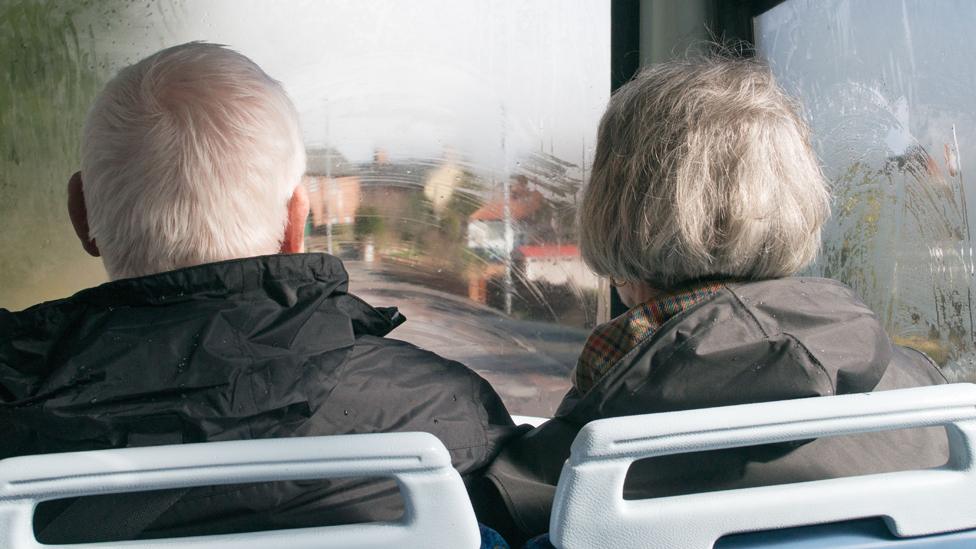Do pensioners get a better deal than working-age people?
- Published

Departing Work and Pensions Secretary Iain Duncan Smith has warned that the government risks dividing society by protecting pensioner benefits at the expense of working people. But do some key policies over recent years back up his comments?
It's become a growing complaint among younger parts of the UK population that the retired and those about to retire are getting a better deal. So, what do current policies implemented under the Conservative and coalition governments, and the previous Labour administration, mean in practice?
Pensions triple lock
Since April 2011, the basic state pension has been protected by a "triple lock", meaning that it will rise each year in line with average earnings, consumer price inflation or 2.5% - whichever of the three is highest. This means that wage earners, on average, can never do better than pensioners, in terms of increase. Prime Minister David Cameron has promised this will be maintained.
In 2011-12 the weekly basic state pension was £102.15, external. For 2015-16 it was £115.95. That represents a 13.5% rise. In a similar four-year comparison, average weekly wages rose from £467 in January 2012, external to £497 in January, external this year. That's a rise of 6.4%.
The Institute for Fiscal Studies says pensioners have been "remarkably well protected from tax and benefit changes" and has questioned whether the triple lock should go. But the prime minister has promised to keep the triple lock, saying it is a fair reward for people who have worked all their lives and deserve security in old age.
And the basic state pension only comes to just over £6,000 a year.
Under triple lock, pensions have only gone up by a greater amount than would have happened under the old system once in five years, says Neil Duncan-Jordan of the National Pensioners Convention, adding that it's wrong to try to "create a phoney war between generations".

David Cameron talks to pensioners, October 2014
Working-age benefits
Most working-age benefits, such as tax credits, will be frozen for four years from 2016, following a 1% maximum level for rises imposed for the previous three years.
Meanwhile, the benefit cap will be reduced from £26,000 a year to £23,000 a year in London, and £20,000 in the rest of the country.
Any family with a third or subsequent child born after April 2017 will not qualify for Child Tax Credit, which amounts to up to £2,780 a year per child.
The IFS argues the changes have hit and will hit working families on lower incomes, particularly those with children. There have been "significant losses for those of working age in the bottom half of the income distribution", it says, adding: "That is not surprising as a result of various cuts to working-age benefits have taken effect."

Income tax
But a key policy of the coalition and Conservative governments has been to raise the personal allowance, external - the income level below which people pay no income tax. It's gone from £6,475 in 2010/11 to £10,800 in 2016/17. The IFS says this initially benefited the lowest earners but, since many have already been taken out of income tax, further rises in the threshold will benefit those on middle incomes.
Pensioner 'perks'

Under a policy introduced by Labour in 2001 and maintained by subsequent governments, any UK household with someone over 75 living in it can get a free TV licence. This currently saves the beneficiary £145.50 a year.
If the person gaining it lived to 83 (the average for men who get past 65), this would save £1,164. Or if they lived to 86 (the average for women who get past 65), £1,600.50 - at the current rate.
Men and women are entitled to a winter fuel payment of £100 or £200 when they reach 63. The maximum payment per-person rises to £300 when people reach 80.

Men and women in England are entitled to a free bus pass when they reach the age at which women receive a state pension. This is currently 63 years old or 62 years and 11 months, depending on the woman's exact date of birth. From 6 July it will be over 63 for everyone. In London everyone can claim the pass at the age of 60, with Tube travel also free.
In Scotland, Wales and Northern Ireland, men and women can both get a pass at age 60. In Wales and Scotland they may also get cheaper train travel, while in Northern Ireland this is free.

A survey of 2,000 adults for PwC in February and March suggested that 48% thought pensioners should keep all these benefits - TV licences, bus passes and the fuel allowance - while 42% thought they should be means-tested.
"Avoidable" winter deaths would be "considerably worse" without the fuel payment, says Caroline Abrahams, charity director for Age UK, who adds: "It is also crucial that older people are able to get out and about, especially as the evidence shows this helps them retain health and independence for longer." But the Taxpayers' Alliance has said these benefits can and should be cut.
Retirement Age

From 6 July the age at which the state pension is payable, external will be over 63 for women and 65 for men. Until 2010 the age was 60 for women. By 2018, men and women will both receive the state pension from age 65.
This will rise to 66 by 2020 and 67 by 2028. It will then reach 68 by 2046.
Because of an ageing population, with more people living well into retirement, this is deemed necessary to try to manage expenditure on pensions. During the whole debate on generational differences, many will point out, it must be remembered that young people will one day become pensioners too.
Low interest rate

Of course, the Bank of England, rather than the government, sets the interest rate. But since March 2009, it's been 0.5%. As recently as 2007 it was 5.75%. This has hit savers, more common among the elderly than the young.
But the Institute for Fiscal Studies says the income derived from interest on accounts is vastly smaller than that for state and private pensions.
Many of those with flexible mortgages, especially those on tracker mortgages, have benefited. However some lenders have been accused of not passing on the benefits of lower rates.
But in recent years UK inflation has been extremely low and this seen as good for those on fixed incomes - such as pensioners.
Help to Buy

Possibly the biggest intergenerational difference in the UK is in property wealth. Older homeowners have benefited from years of soaring house price growth, allowing them now to downsize and use the profits to help fund their retirement.
Younger people have never faced a more difficult housing market. The average age for a first-time buyer is 30, according to the Council of Mortgage Lenders. This has stayed roughly the same since the crisis, although the proportion receiving help from family to get a deposit together increased sharply as banks tightened-up lending, external in 2008.
There has been some suggestion that recent housing policies - focused on helping younger buyers - have in fact further driven up prices, external.
In 2013 the government brought in Help to Buy. Under it, the government provides equity loans for up to 20% of the price of a new-build home in England, worth up to £600,000. First, the buyer must save up a 5% deposit. The remaining 75% must be in the form of a mortgage.
The homelessness charity Shelter estimated last year that Help to Buy had added £8,250 to the average house price, as supply hadn't grown quickly enough. It said the scheme had "helped a small number of people to buy, at the expense of worsening the overall affordability crisis for everyone else".
But the Council of Mortgage Lenders says Help to Buy has worked in helping cut the number of first-time buyers needing family help, although not yet to pre-crisis levels. "In reality this is largely substituting one form of assistance for another - state assistance has replaced some of the help from parents," a spokesman says.
Help to Save
In his latest Budget, George Osborne said low-paid workers who put aside savings could receive a top-up of up to £1,200 over four years.
Those on in-work benefits who put aside £50 a month would get a bonus of 50% after two years - worth up to £600. This is repeatable after another two years of saving at the same rate.
If taken up, this is beneficial to lower earners, but it's debatable how many could afford to do so.
In 2010 Chancellor George Osborne dropped the Labour scheme, which also matched 50p in every pound of savings from low-income workers, saying it was "not affordable". But, unlike the Labour scheme, "Help to Save" is available for four years rather than two, and is open to workers earning up to £30,000 a year, according to the Resolution Foundation social policy think-tank.
Lifetime Isa
Under plans announced by George Osborne in the Budget, people aged under 40 in April next year will be able to save up to £4,000 each year into the Lifetime Isa. They will receive a £1 contribution from the government each year for every £4 saved.
This top-up, available from age 18, will last until savers reach 50. The funds can be used to help buy a first home costing up to £450,000 or can be withdrawn from age 60 for use in retirement.

Today marks Maundy Thursday, when the Queen hands out a coin-filled purse to pensioners
Subscribe to the BBC News Magazine's email newsletter to get articles sent to your inbox.